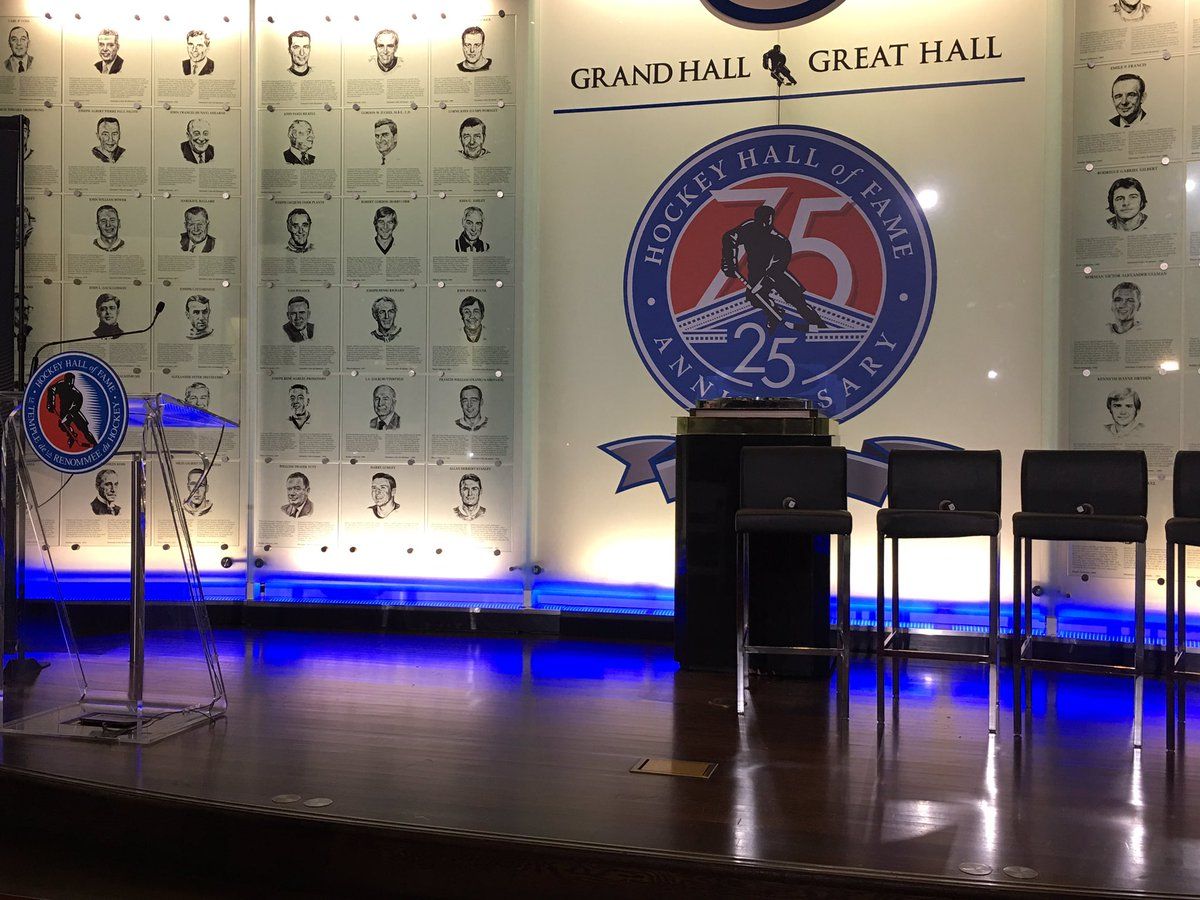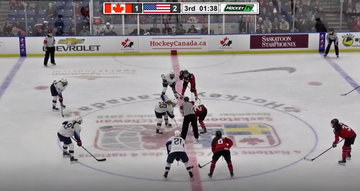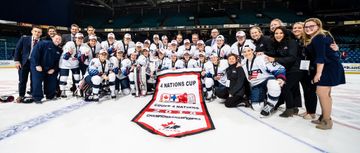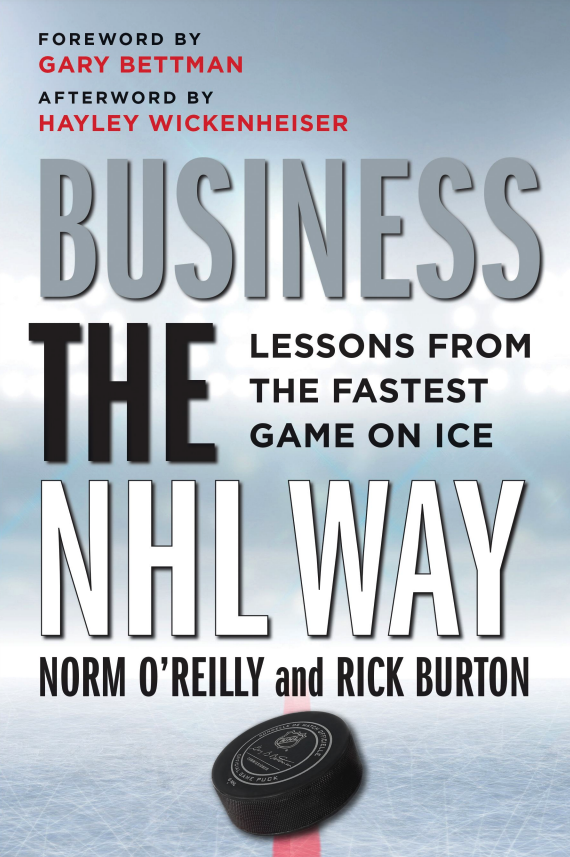It's the year 2018. There are two North American women's hockey leagues; the Olympics have hosted a women's hockey tournament for the last six Winter Games; and six women are in the Hockey Hall of Fame. For some, this is progress. For others, it's a slow beginning. Either way, conversations about women's professional hockey in North America appear to be more mainstream than ever.
With that comes the call for one united women's hockey league from players, fans, and even hockey executives. Hockey leadership in Canada and the United States seem to be stalling on a surefire thing. So, what is the holdup? The Victory Press spoke to commissioners of the Canadian Women's Hockey League (CWHL) and the National Hockey League (NHL) in Toronto during the 2018 Hockey Hall of Fame induction press conference.
Jayna Hefford was named interim CWHL Commissioner one month after being named to the 2018 Hockey Hall of Fame class as a player. She and NHL Commissioner Gary Bettman will be enshrined together on Monday as two people who have had profound influence on the game, and both of their roles as builders will be ongoing. (For a closer look at Hefford's playing career, which is characterized by a knack for scoring goals that, over time, loomed larger than they did when they hit the back of the net, check out this piece by Tracey Myers for NHL.com.)
"Gary and I have had a chance to get to know each other. We've run into each other a few times in the last month and to be able to spend the weekend here [in Toronto]. It's an opportunity to get to know him on a personal basis and build that relationship," said Hefford while standing in the Esso Great Hall of the Hockey Hall of Fame Friday afternoon.
Having two commissioners and likely several NHL and CWHL staff in one place seemed like a golden opportunity to discuss the future, especially one with several variables to be worked out.
To begin, the hockey community appears to agree one women's professional league in North America is the eventual path forward to greatest success. However, since 2015 when Dani Rylan started the National Women's Hockey League (NWHL), there have been two leagues.
While the CWHL runs on a non-profit model, the NWHL is a for-profit model. This makes a merger (or an acquisition) an unappealing situation. However, there is one league with the financial and marketing resources to make either of those things happen. Yet, the NHL is not interested at the time.
"It's just it's in a state of flux," Bettman told The Victory Press on Friday. "There are two leagues. The business models are a little challenged. I'm not sure there's enough talent at this point in time for two leagues under the right circumstances."
The sentiments aren't new. However, the messaging appears counter to the present reality. To begin, the NHL is already involved in women's hockey. Bettman and the NHL have contributed funds to USA Hockey for the national team (or, as a direct connection to resources promised to the women's team). According to a report by espnW, the NHL reportedly provided enough funds for $25,000 per USA Hockey player to close the labor deal ahead of the 2017 Women's World Championships.
The more involved the NHL front office becomes, the more likely the future of women's hockey will rest in the hands of men's hockey's money.
"We've said repeatedly we would get involved in starting our own women's league, but it's not something we're going to do -- we're not going to interfere with the work that the other leagues are doing," Bettman told The Victory Press on Friday.
He continued, "We can be supportive to an extent but at some point in time, if it makes sense and all the leagues think it makes sense, then maybe we'll start something up on our own." Twice in his remarks, Bettman separated a hypothetical NHL-run women's hockey league from the two existing North American leagues.
By the NHL commissioner's own analysis, a women's hockey league would not be about making a profit and instead offering growth opportunities to girls and women at all levels. "To me, it's not about an economic opportunity," he shared on Friday. "I don't think anybody will ever get rich, certainly for the foreseeable future, from a women's hockey league. But the opportunities there to encourage the growth and development of women's hockey at all levels."
Interestingly enough, the CWHL was founded with that goal in mind. According to the league website, the CWHL began in 2007 with the mission to "create a place for the highest-level women's hockey players to continue to compete and hone their skills, and to create a future for the sport of women's hockey."
So again, the hesitation to get involved and the lack of regard for the current models is baffling. The picture becomes a bit clearer when we asked Bettman if the future of women's hockey could evolve from the existing leagues. He responded that a clean slate is needed: "Once the NHL embraces it, failure is not an option. And if we've got to own the success or failure, then it's got to be on our terms."
None of the three leagues has operated without its issues with players, owners, investors, and fans, as Bettman knows himself all too well. So, to what extent the commissioner foresees an NHL-run women's league failing, especially if operating under a more non-profit business model, is unclear. On the one hand, it is not unusual for an incoming owner or manager to clean house and establish a new culture. Yet, is that what women's hockey needs?
Both women's leagues have established, with limited resources, international attention for hockey via live streams. Both leagues have established roots primarily on the East Coast of North America. Would a fresh start be akin to throwing the baby out with the bathwater?
No question, there are inherent flaws that a "simple" merger presents. To begin, the Worcester Blades (formerly the Boston Blades) and the Connecticut Whale (in the CWHL and NWHL respectively) have struggled in the standings and with attendance. Neither league reports official attendance numbers, but a quick look at live video or images from homes games for either team supports the conclusion.
Comparatively, the CWHL's Calgary Inferno and NWHL's Minnesota Whitecaps appear to be viable markets. The flaw is their distance from the other established markets on the East Coast. If one women's league were to consolidate, would they make decisions about franchising based on the current talent in their markets or the current interest from the fan base?
Geography of current women's hockey players might be moot, if the hypothetical one league committed to air travel, paid higher salaries, and/or offered accommodations (housing, transportation, off-ice employment, or educational opportunities) to make moving into any market viable for the athletes.
As we already see with the financial support given to USA Hockey, the NHL has the capability to immediately elevate women's pro salaries to a livable wage. Yet, they did not do so for the eight years the CWHL operated as the only pro league in North America, and still don't for anyone except the 23 rostered players for the U.S. Women's National Team. To make the sport a viable profession, more attention is needed to what happens between the Winter Olympics.
When it comes to bringing more attention to women's hockey, Commissioner Hefford has her eye on successful women's models in other sports, such as soccer. "One of those big hurdles I think is for a long time, we've always said about women's hockey, we're trying to attract young girls," said Hefford.
However, when she attended a National Women's Soccer League game in Portland, things were different. "It was obvious in Portland that's not what they're trying to attract," Hefford said. She saw soccer fans of all genders and ages rooting for the Thorns, and that is the vision she has for women's hockey as well. "You're trying to attract hockey fans: girls, boys, men, women, college folks. It doesn't matter [who it is]. It's about people who love the game because we believe in the product and we believe in the athletes. So, that's our goal."
The Portland Thorns average the highest attendance in the NWSL, year after year. In 2018, they averaged 13,320 fans per game, more than double the 2018 league-wide attendance average of 6,017 fans per game. They have done so through courting MLS owners to operate women's teams as well, such as Merritt Paulson who owns the Portland Timbers and the Thorns.
As it would turn out, the NWHL is the first women's league in North American to adopt this model. Last season, Terry and Kim Pegula became the first private owners of a women's hockey team, as their company Pegula Sports and Entertainment acquired the NWHL's Buffalo Beauts. PSE also owns the NFL's Buffalo Bills, the NHL's Buffalo Sabres, and the AHL's Rochester Americans, among other sports-related assets. The year before the Beauts' acquisition by PSE, the New Jersey Devils entered a three-year strategic alliance with the Metropolitan Riveters of the NWHL. The Calgary Flames, Toronto Maples Leafs, and Minnesota Wild are just a few other teams partnering with women's pro hockey teams in North America.
"Everybody says they want to support the women's game and they want to support women's hockey, but we we really need to see it in a tangible way. We need to see people at the games. We need to see people watching the games on their television," said Hefford of what needs to happen between Olympic cycles.
Hefford rightly asks women's hockey to take responsibility to generate interest in its own product. However, this could equally serve as a call-out those who have the capability to broadcast and market women's games and choose not to.
Bettman wants the women's hockey community to simply hand over the keys. However, without more commitment to the game presently, it seems unlikely either league will do so. He also calls both models flawed, despite appearing to see value in an investment in women's hockey as a charitable, non-profit endeavor, akin to the current CWHL model, and despite the fact that NHL owners clearly see value in investing in women's hockey through the NWHL business model.
Bettman has gone on record saying if and when both leagues come to the NHL and say they have "had enough", he and the NHL will get involved. He has previously told the Associated Press that he doesn't want "to look like a bully" and force the other leagues out of existence.
However, Bettman's choice to dangle NHL money and an often-cited NHL model for women's professional hockey comes off as a power move.
The insistence that the NHL own women's hockey outright is troubling. Overall, the state of women's hockey appears to be made of many things unsaid and unseen, including actual women's games, and women themselves.
For now, we wait to see who will blink first.




